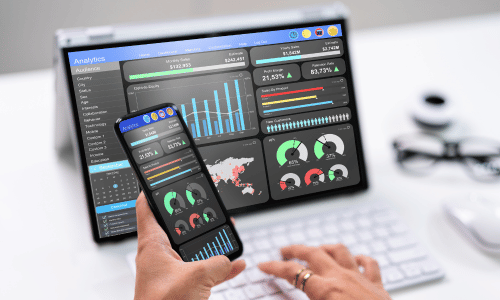
In an era where data is coined as the new oil, harnessing the power of business analytics becomes not just an asset but a necessity for organizations aiming to secure a competitive edge. Business analytics transcends traditional data analysis, offering a beacon for strategic decision-making, operational efficiency, and customer-centric approaches. This article embarks on a journey to explore the multifaceted role of business analytics in modern business strategy, highlighting key components, strategic implementations, and real-world success stories.
Understanding Business Analytics
Business analytics stands at the intersection of data, technology, and business insight, offering a panoramic view of an organization’s past performance while paving the way for future success. It’s an amalgamation of data management, analysis techniques, and predictive models, aimed at enhancing decision-making and strategic planning.
The Core Components of Business Analytics

Data Management: The cornerstone of effective business analytics, ensuring data integrity, availability, and security.
Descriptive Analytics: Offers a hindsight view of business operations, analyzing past data to understand trends and outcomes.
Predictive Analytics: Employs statistical models to forecast future trends, enabling proactive decision-making.
Prescriptive Analytics: Goes beyond prediction to recommend specific actions that can drive desired business outcomes.
Strategic Implementation of Business Analytics
The strategic value of business analytics is unlocked not just by possessing data but by embedding analytics into the DNA of organizational decision-making.
Establishing a Data-Driven Culture

Fostering a culture that values data as a critical decision-making tool is paramount. This cultural shift requires leadership endorsement, continuous education, and a shift from gut-based to data-driven decisions.
Investing in the Right Tools and Technologies
The landscape of business analytics tools is vast, from comprehensive platforms like SAS and Tableau to specialized software tailored to specific industries. The key is to choose tools that align with the organization’s size, complexity, and specific analytical needs.
Leveraging Data for Competitive Advantage
In the digital battlefield, data serves as ammunition for gaining a competitive advantage. Business analytics unlock the potential of this data, revealing insights that can lead to strategic pivots and innovation.
Customer Insights

Deep dives into customer data reveal preferences, behaviours, and patterns. These insights can inform product development, marketing strategies, and customer experience enhancements, leading to increased loyalty and revenue.
Operational Efficiency
Operational data holds the key to uncovering inefficiencies, bottlenecks, and opportunities for cost reduction. Analytics can guide process optimizations, supply chain enhancements, and resource allocation, driving significant savings and performance improvements.
Overcoming Challenges in Business Analytics
Despite its potential, the path to harnessing business analytics is fraught with challenges, from data silos and quality issues to cultural resistance.
Ensuring Data Quality
The adage “garbage in, garbage out” holds particularly true in analytics. Ensuring data accuracy, consistency, and completeness is fundamental to reliable analytical outcomes.
Bridging the Skills Gap
The complexity of business analytics necessitates a blend of technical, business, and analytical skills. Building in-house capabilities or partnering with expert providers can mitigate this challenge.
Case Studies: Success Stories of Business Analytics
Across sectors, organizations have leveraged business analytics to drive remarkable transformations and achieve strategic objectives.
Retail Revolution with Predictive Analytics

A global retail giant implemented predictive analytics to refine inventory management and personalize customer marketing efforts. The result was a double-digit growth in sales and a substantial increase in customer satisfaction and loyalty.
Manufacturing Efficiency through Prescriptive Analytics
A leading manufacturer utilized prescriptive analytics to streamline its supply chain and optimize production schedules. The impact was multifaceted: reduced operational costs, improved product quality, and faster time-to-market.
Conclusion
The strategic deployment of business analytics can be a game-changer for organizations, offering insights that inform better decisions, drive efficiency, and foster innovation. As data continues to grow in volume and complexity, the ability to analyze and act on this data becomes a critical success factor. Embracing business analytics is not just about adopting new technologies but about transforming organizational culture, processes, and strategies to be truly data-driven. In doing so, businesses can navigate the complexities of the modern market with confidence and agility, turning data into a strategic asset that propels them towards future success.
We’ve explored the transformative impact of business analytics on businesses today. How have you or your organization used analytics to drive decisions or strategy? Are there challenges you’ve faced or successes you’d like to share? Let’s broaden our discussion and learn from each other’s experiences. Your insights are invaluable to our community’s growth and understanding of business analytics. Share your thoughts and let’s continue to explore the power of data together!
Discover related content by exploring: Big Data Analytics Driving Business Insights





